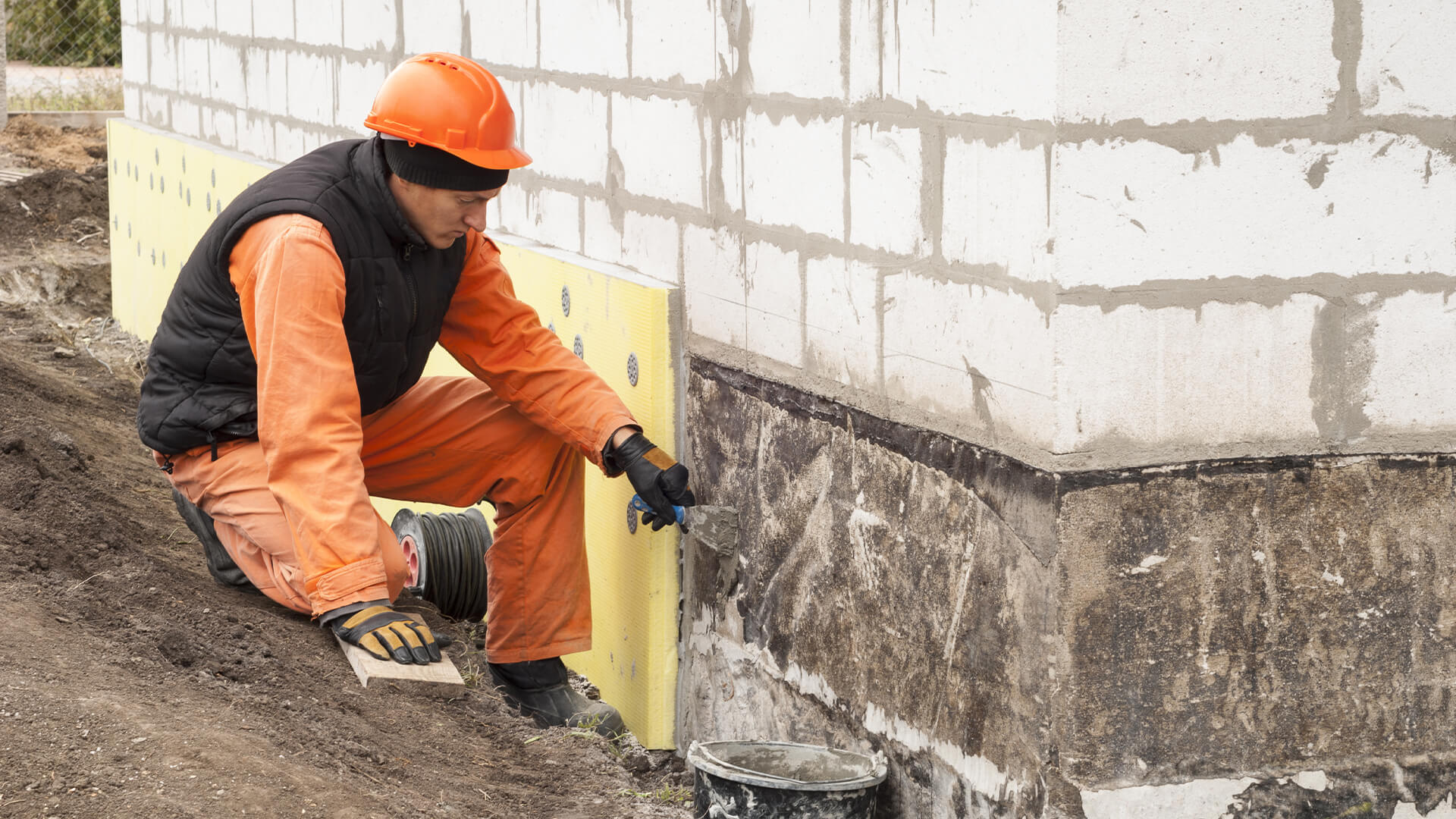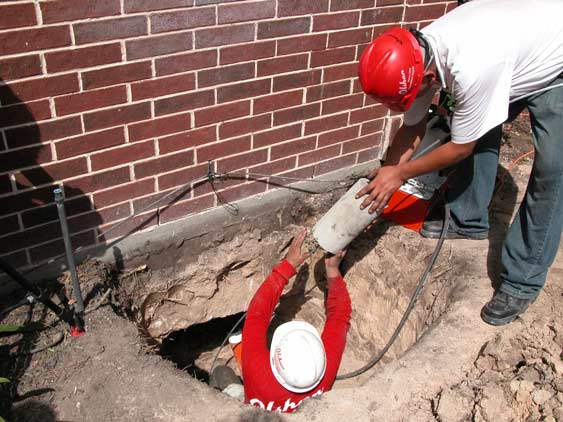Essential Guide to Foundation Repair OKC: What Homeowners Required to Know
Essential Guide to Foundation Repair OKC: What Homeowners Required to Know
Blog Article
Discovering Different Methods of Structure Repair Service for Different Soil Kinds
Structure repair work is a critical element of keeping structural honesty, especially when taking into consideration the diverse challenges positioned by various soil types. The intricacy of dirt behavior under varying problems demands a tailored approach to repair, making sure optimum remedies such as helical piers for unstable soils or chemical grouts for cohesive layers.
Comprehending Soil Types
Soil types play an essential duty in the security and long life of structure foundations, making it vital for house owners and building professionals to understand their characteristics and actions. The communication in between soil and foundation can determine the architectural stability of a building. There are several dirt types, each with distinct physical residential properties that influence exactly how foundations are made and preserved.
Granular soils, such as sand and gravel, provide good water drainage and are often considered stable. They have high load-bearing capacities, which can support larger structures. These dirts can move if not compressed appropriately, leading to potential negotiation issues. In comparison, cohesive dirts like silts and clays display different habits. These dirts have a tendency to retain wetness, and their load-bearing capacity can vary substantially with changes in wetness web content.
Rocky dirts, recognized for their strength and stability, deal outstanding assistance for foundations yet may require specialized equipment for excavation. Alternatively, fertile dirts, which are a well balanced mix of sand, silt, and clay, typically offer desirable conditions for foundation support because of their modest water drainage buildings.

Comprehending these soil types is crucial for picking ideal structure repair service techniques, guaranteeing the sturdiness and safety of structures with time.
Difficulties With Extensive Clay
Among the numerous dirt types, large clay offers distinct challenges for structure stability due to its tendency to go through significant quantity modifications with moisture variant. This sort of dirt swells when wet and contracts when completely dry, which can exert substantial pressure on structures. These changes can result in structure breaking, heaving, and settlement problems, posing significant dangers to the architectural stability of buildings.
The difficulties with expansive clay are aggravated by its plasticity index, which measures the dirt's capability to transform shape and quantity. A high plasticity index indicates higher capacity for movement, boosting the possibility of damage to structures. This is specifically troublesome in areas experiencing frequent or severe climate changes, where cycles of damp and completely dry conditions prevail.
Moreover, the depth of expansive clay layers can vary, complicating the assessment and planning of proper foundation repair work methods. These complexities require a comprehensive geotechnical assessment to guarantee effective foundation repair approaches are applied, stressing the value of attending to extensive clay difficulties with know-how and care.
Solutions for Sandy Soils
Sandy soils, identified by their big bit dimension and low communication, present distinct difficulties for foundation security due to their propensity for shifting and disintegration. By securing the structure to deeper, more stable dirt layers, these systems can provide the needed assistance to neutralize the changing nature of sandy soils.
An additional recommended method is the application of soil stabilization methods. Chemical grouting, for circumstances, involves infusing a stabilizing representative right into the soil, which boosts communication and decreases leaks in a fantastic read the structure. This process helps to strengthen the sandy substrate, therefore reducing the danger of disintegration and movement.
Furthermore, mounting proper drain systems is crucial in sandy soil problems. Ensuring appropriate water drainage can prevent water accumulation around the foundation, which usually exacerbates erosion and soil displacement. Strategies such as French drains pipes or surface area grading can be employed to direct water away from the structure border.
Dealing With Working Out in Loamy Soils
Fertile soils, known for their balanced mix of sand, clay, and silt, supply an abundant base for many frameworks but can sometimes cause structure settling because of their one-of-a-kind make-up. This well balanced structure supplies exceptional water drainage and nutrient retention, making it excellent for farming and landscape design. Nonetheless, this very same attribute can end up being troublesome for foundations, as shifts in moisture web content can create the dirt to broaden or contract, resulting in settling.
Addressing resolving in fertile soils requires a complex technique. At first, accurate dirt testing is essential to determine the details structure and moisture web content of the loam. As soon as data is collected, carrying out proper a knockout post drain solutions is necessary to preserve consistent wetness degrees, thus lowering the danger of dirt contraction or development. French drains or surface area grading are effective techniques to redirect water away from the structure.

Ingenious Repair Service Techniques
In the world of structure repair work, innovative strategies are continuously being established to deal with the complex tests presented by various dirt conditions. As dirt kinds differ significantly in their architectural properties, typical techniques may not constantly are sufficient. The introduction of brand-new innovations in foundation repair service offers much more tailored remedies, making certain security and durability.
One remarkable advancement is using helical piers, which are especially reliable in expansive or unsteady dirts (foundation repair okc ok). These piers are screwed right into the ground until they reach a secure layer of dirt, providing solid assistance for the foundation above. This approach minimizes interruption and is versatile to various soil types, making it a flexible solution
One more cutting-edge strategy is the application of polyurethane foam shot. This method includes infusing high-density polyurethane foam under the foundation to fill up gaps and stabilize the framework. It is a much less invasive option to typical foundation, offering quick installment with marginal disturbance to the surrounding area.
Furthermore, dirt stabilization techniques, such as using chemical cements, have acquired traction. These compounds boost soil stamina and reduce leaks in the structure, preventing future moving. Collectively, these innovative repair work hop over to here techniques offer efficient remedies for the diverse challenges positioned by differing soil problems.
Final Thought

Structure repair is an important facet of maintaining structural stability, specifically when considering the diverse obstacles positioned by various dirt kinds (foundation repair Oklahoma). The complexity of dirt habits under differing problems necessitates a tailored method to repair, making certain ideal options such as helical piers for unpredictable dirts or chemical cements for natural layers. By securing the structure to much deeper, extra secure dirt layers, these systems can provide the necessary support to counteract the shifting nature of sandy soils
Foundation repair requires careful consideration of dirt kinds to make certain security and long life. Chemical grouts boost soil stamina and decrease permeability in cohesive dirts.
Report this page